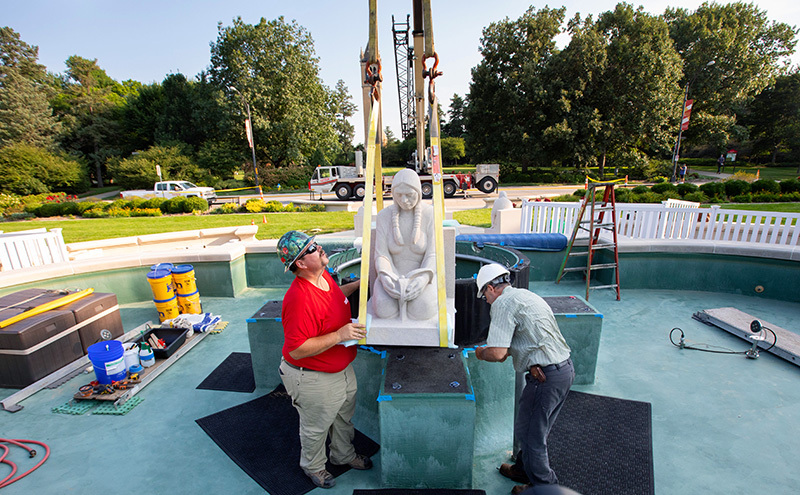Saturday night under the lights
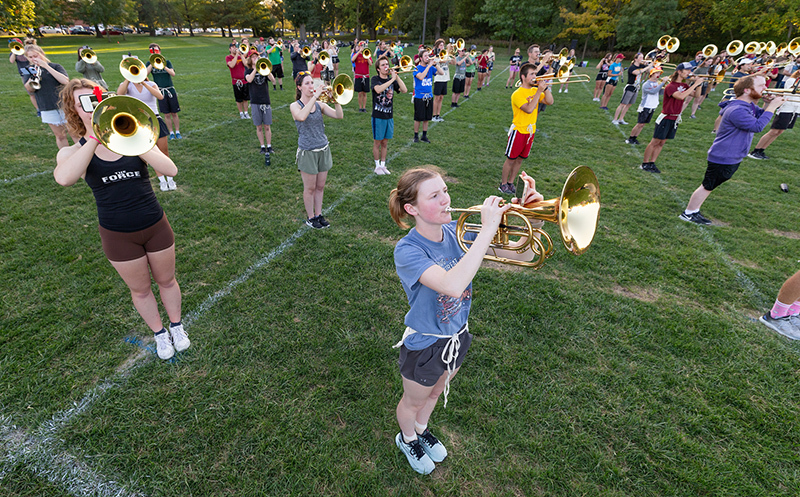
Photos by Christopher Gannon.
As the Cyclone football team prepares for its first Big 12 Conference home game of the season Saturday night (6:30 p.m. kickoff against Baylor), the Cyclone Football 'Varsity' Marching Band is completing preparations of its own this week.
(Above) Mellophone lead player Emma Heine (front) practices with her bandmates Monday afternoon on the band's practice field west of the Communications Building. (Below) Members of the sousaphone section practice a high-energy march at Monday's practice.
The theme for the band's Saturday evening halftime performance in Jack Trice Stadium is "The Wizard of Oz." It will include music from the original 1939 film, hit musical "The Wiz" and the Broadway sensation "Wicked."
Halftime isn't the band's only assignment. Game Day for band members also includes a spirit rally north of the stadium as the football team arrives, tailgate step show at the Alumni Center and a pregame performance on the field.
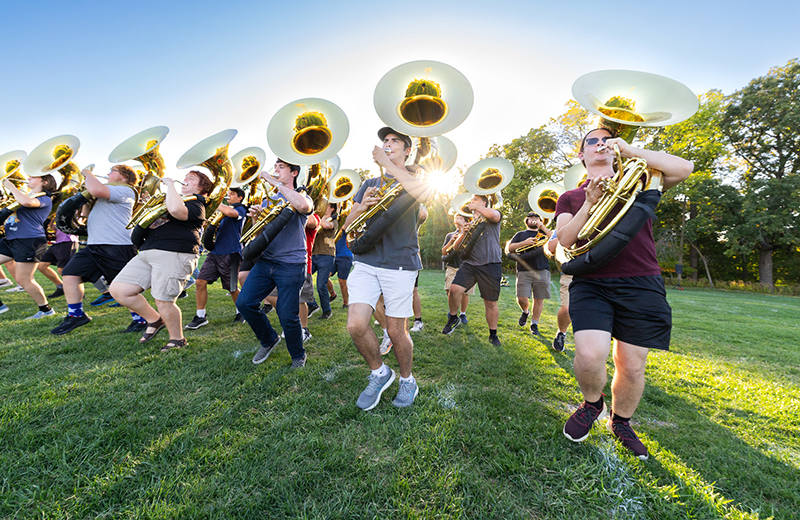
Flu shot clinic is Oct. 7-18
ISU WellBeing and occupational medicine will offer a free employee flu shot clinic Oct. 7-18 (Monday through Friday, 9 a.m.-4 p.m.), at the fitness studio (room 1218) in the southeast corner of State Gymnasium.
No appointment or registration is needed, and participants will check in electronically with their ISU ID number when they arrive. More than 2,700 shots were given during last year's clinic, said ISU wellbeing and worklife, senior coordinator Stephanie Downs.
The vaccine is available for these employee groups:
- Faculty, professional and scientific, merit and postdocs
- University child care centers
- Retirees on the university health plan who are not yet 65
- ISU Foundation
- Iowa State Daily
These employees are encouraged to use the clinic to receive the shot because it is the most cost-effective with the ISU medical plan. Staying healthy is one way to help control insurance costs at the university. A copay may apply for vaccines received at a pharmacy or health care provider's office.
"Financially, there is a savings to employees if they go through the clinic rather than if they go through a pharmacy or medical provider," Downs said. "Prevention is key -- and it may not 100% eliminate the risk of getting the flu -- but it will build the antibodies to protect against it. It also leads to having less severe symptoms if they do get the flu."
Employees' spouses and children are not eligible for the clinic, but family members covered by ISU health insurance can receive a flu shot from their medical provider or a retail pharmacy. Visiting scholars and students should contact the Thielen Student Health Center, 294-5801, for vaccination information.
Employees are encouraged to walk to the clinic at State Gym and enter through the south corner of the building. The vaccination clinic is close to this accessible entrance. Parking will be available in the general staff lot (Lot 1) south of the building that runs parallel to Sheldon Avenue. A limited number of free reserved spaces will be available close to the building. CyRide also stops next to State Gym on Union Drive.
"It is the same location as last year," Downs said. "We feel we can get people in and out in about five minutes unless there's a rush of 20 or more people at the same time. The convenience is a big part of this clinic and we want to keep it that way."
Two nurses will administer the shots. If possible, employees are asked to wear a short-sleeve or loose-fitting shirt to give the nurse easier access to an upper arm. Employees can exit the clinic immediately after receiving their shot. Participants in ISU WellBeing's Adventure2 wellness program will receive 50 points for getting a flu shot.
A COVID-19 vaccine or booster is not available at this clinic. Those wanting one should contact their primary health care provider.
The vaccine
Employees who get a shot will receive a three-component vaccine that protects against A and B flu virus strains. The vaccine contains the three viruses recommended this season by the Centers for Disease Control and Prevention (CDC):
- A/Victoria/4897/2022 (H1N1)pdm09-like virus
- A/Thailand/8/2022 (H3N2)-like virus
- B/Austria/1359417/2021 (B/Victoria lineage)-like virus
High-risk employees who are pregnant, older, or have other medical conditions or disabilities should consult CDC guidelines. For those 65 and older, the higher dose vaccine is recommended but not available at the clinic.
It takes about two weeks for antibodies that protect against the flu to fully develop. It's not possible to get the flu by receiving a flu shot because it is not a live virus, ISU wellbeing specialist Heather Burke said. Individuals may feel feverish after getting the shot, but that reaction can be the body developing the antibodies.
More information about the flu clinic is on the ISU WellBeing website or by calling the university human resources service center at 294-4800. Information about the 2024 flu season is available through the CDC.
Availability of the flu vaccine after the clinic concludes will depend on supplies, and additional information will be shared later.
Prep begins to support employees likely to become overtime-eligible
Pay close attention to your email inboxes starting next week. A series of communications is coming to help prepare employees -- approximately 500 -- who are likely to transition to overtime-pay eligibility for the first time on Jan. 1, 2025.
Changes to federally mandated overtime pay regulations in the Fair Labor Standards Act (FLSA) were announced earlier this year. They involve a two-step process. In phase 1, the minimum salary threshold for overtime eligibility rose on July 1 to $43,888. In phase 2, coming on Jan. 1, the threshold will rise to $58,656.
What the new threshold means
If your salary is above the threshold, you're exempt from the federal mandate for overtime pay. If your salary falls below the threshold, you are nonexempt -- you become eligible for overtime pay (at least 1.5 times your regular rate) for the hours you work beyond 40 hours per week. Some exceptions exist, but those will not apply to the majority of employees impacted by the new threshhold.
Employees who become overtime-eligible for the first time in January will be required to:
- Track their time by regularly entering their work hours and continuing to request time off in Workday.
- Prepare for a transition from a monthly pay schedule to a semimonthly pay schedule.
These requirements will necessitate timely trainings of employees and managers, and the support and guidance of managers -- all before Jan. 1.
Salary increases could have a role
A challenge, which will be resolved in the weeks ahead, is pinpointing exactly which and how many employees will be impacted. Why? Because occurring in tandem with this federal mandate is the university's performance-based salary increase process for faculty, professional and scientific (P&S) staff, contract staff and postdoctoral researchers. When finalized, performance-based increases will move some employees currently below the proposed salary threshold to a point above the threshold.
That's why, starting next week, paying special attention to messages in your inbox is important. Here are the scheduled communications from university human resources (UHR) planned for specific groups of employees:
- Employees who remain exempt, despite being below the Jan. 1 salary threshold. FLSA allows exceptions to federally mandated overtime for employees carrying out certain responsibilities. Examples include academic advisors and student services specialists. For those in this group, watch for a message the week of Oct. 7.
- Managers of employees likely to be impacted. Even with performance-based salary increases, some employees are likely to fall below the new salary threshold. Managers will need to discuss the changes with these newly nonexempt employees and help them make the transition. For those in this group, watch for a message the week of Oct. 7.
- Employees likely to be impacted. UHR will notify employees likely to have salaries falling below the Jan. 1 threshold. "Likely" will remain a key term until final exemption status is determined. For those in this group, watch for a message the week of Oct. 14.
Workshops for managers
Managers play a critically important role in ensuring compliance with the new FLSA regulations -- and making sure their valued employees are supported through the transition. From Oct. 7 through Nov. 22, UHR will make available in-person, hands-on workshops for managers with newly nonexempt employees. Managers will need to complete online prerequisites in advance of the workshops. For impacted employees, online training for time tracking is offered in Workday Learn.
Here's one last caveat: There remains the possibility that legal challenges to the new salary threshold could result in a court-ordered pause in its implementation. That would trigger another communication from UHR.
UHR will provide more information and resources to impacted employees and managers as they are available. Check out the FAQ with answers to questions about the new federal overtime requirements.
Related stories:
- University prepares for second phase of federal overtime pay changes, Sept. 12, 2024
- Paycheck cycle for salary nonexempt employees to change this fall, May 23, 2024
- Federal changes increase minimum threshold for overtime pay, April 25, 2024
Five questions with the council president
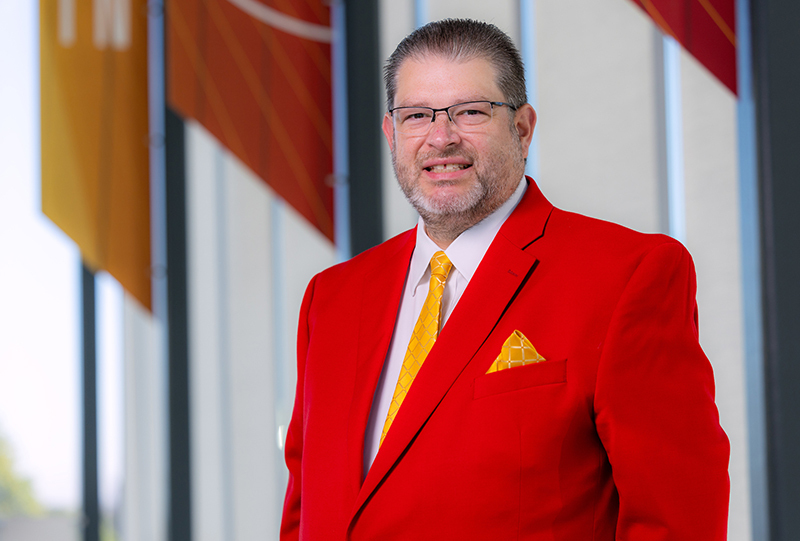
Following a year as president-elect, Jason Follett leads the Professional and Scientific Council this year. Photo by Christopher Gannon.
Meet:
Jason Follett, president, 2024-25 Professional and Scientific Council
Position: Academic advisor, software engineering
Years at Iowa State: 13 (2005-10, teacher education program, College of Human Sciences; 2016-current, software engineering program)
What's top-of-list for the council this year?
Four goals emerged from the P&S Council executive committee's work session in July. The first two are carry-overs from last year because they remain important.
- Maximize the student experience. It can be as simple as offering directions out on the sidewalk.
- Assist with educating P&S employees about optimizing their benefits package.
- Advocate for equal and fair treatment of all P&S employees. An example could be the P&S employees impacted as the university implements changes due to SF 2435's restrictions on diversity, equity and inclusion.
- Review and advocate for P&S involvement in decisions that impact P&S employees, the largest employee group on campus.
What might surprise us about you?
I didn't graduate from Iowa State. I wear Iowa State clothing every day, often on the weekends, I even have a red suit coat. My license plate is Iowa State, my office is full of Cyclone trinkets, I work on the events crew at Hilton Coliseum. I live and breathe Iowa State. My bachelor's degree is from the University of Northern Iowa and my master's degree is from Buena Vista University in Storm Lake.
Listen in
The next meeting of the P&S Council is Thursday, Oct. 10 (2:10 p.m.).
What's important to you as council president this year?
- Recognizing and thanking P&S employees for their loyalty. People move around a lot, and not everyone is going to make it to the 25 Year Club, but 10-year employees can have impact, too. There are inexpensive ways to say "thank you" or "we appreciate you."
- We're the largest employee group on campus, so more supervisor training could have a big impact. This is always something we advocate for; it's just a slow boat. This year, there are two opportunities especially: We'd like to see a unified evaluation system on campus -- all P&S employees evaluated using the same process and document. And, with the changes to the Fair Labor Standards Act, it's important all supervisors understand what's happening and why.
Will the council host another professional development conference?
Yes. Mark your calendar: Feb. 27, 2025. I encourage everyone to look at the schedule when it's ready. If they're having trouble paying for their registration or must use vacation time to attend, we'd like to know about that. This goes back to fair and equal treatment for all P&S employees. Our first conference (2013) was the outcome of several years of council leaders advocating for an affordable professional development opportunity for all P&S employees, so we'd like to avoid hurdles that prevent interested P&S employees from participating.
Tell us about the council's new meeting format and what's behind the change.
Starting this fall, our meetings are based at the Launch Pad (room 4250) in the Student Innovation Center, which is set up perfectly to have council members join virtually on Microsoft Teams. We've had difficulty in the last few years getting P&S employees to run for council positions. During the pandemic, when meetings were online, we had representation from across the state -- our 99-county campus; it was terrific. We also hope more P&S employees will join the meetings (on the council's homepage), even if it's to have the audio on in their earbuds while they're working.
Virtual council meetings also allow committees to meet when it's the best time for them. That might not be immediately prior to the council meeting, which was the practice when we met in person at the Memorial Union.
Eight open educational resource projects receive grant support
Eight projects will share nearly $40,000 in the seventh year of Miller* mini-grants for faculty efforts to develop open educational resources (OER). In addition to giving faculty some freedom to customize their course content, these freely licensed course materials save students money.
The program is co-sponsored by the University Library, Center for Excellence in Learning and Teaching and the office of the senior vice president and provost. The mini-grants, up to $5,000, give instructors time and resources to redesign their courses around the use of OER. The call for proposals for 2025-26 awards will be posted early in spring semester 2025.
Below are project summaries for the eight recipients of 2024 Miller Open Education Mini-grants. The first two are funded from an additional $10,000 track this year that's focused on the United Nations' Sustainable Development Goals (SDG). The ISU Digital Press, a unit of University Library, became a signatory to the SDG Publishers Compact last year to try to bring more attention to the goals, so this is a focus area for new publications by the press.
"We're trying to identify all the ways, big or small, we can support those sustainable development goals," said Abbey Elder, open access and scholarly communication librarian, University Library. "We decided to develop a track in the Miller OER program to specifically fund new projects in this area and give people a jumping-off point for future work."
Project: Can we save ourselves? Building collaborative narratives as a learning tool for humanity's future
Principal Investigator: Kurt Rosentrater, agricultural and biosystems engineering
Courses: HONS 3210 (non-first year seminar); HONS 4900 (Independent study)
This project will involve Rosentrater's students in developing case studies that focus on the United Nations' SDGs. Multiple dimensions of all 17 SDGs will be explored, cataloged and synthesized, including: social humanitarian aspects, environmental impacts, economic costs, government policy choices and individual leadership components. These case studies will be compiled in an open educational resource that will serve as the learning material for subsequent classes.
Project: Empathy-driven design: Tools for inclusive innovation
PIs: Bruno Oro, Matt Obbink and Subinay Malhotra, industrial design
Courses: INDD 3020 and INDD 4010 (studio courses), INDD 4990 (senior project course)
This project will create a responsive and inclusive learning environment that empowers future designers to create impactful solutions for all users, regardless of ability, using method cards, a design tool intended to inspire creativity and discussion. In developing the method cards, students, designers and academics will consider how they can make their work more inclusive. Students will use the method cards to engage in hands-on experiences, fostering a deeper understanding of the diverse needs of users, including those with disabilities.
Project: Video lecture series for parametric modeling and building performance simulations
PI: Chengde Wu, architecture
Courses: ARCH 5430, ARCH 5440, ARCH 6410, ARCH 6420
Teaching graduate-level architecture courses has inherent challenges, including the inconsistent educational background of the students, outdated or inefficient course materials and the high cost of textbooks and online resources. Wu will develop 52 video lectures, 5-20 minutes each depending on the topic, to teach parametric modeling and build performance simulation tools. These video lectures are expected to significantly reduce the gaps among the students' background knowledge by providing high-quality, free course materials to encourage review and lifelong learning.
Project: Creating woodshop safety videos and resources for the College of Design
PI: Peter Scheidt, art and visual culture
Courses: ARTIS 2020, ARTIS 3200, ARTIS 4200, ARTIS 5200 and the college's Model Shop
This project will create a safety handbook for basic woodworking machinery, designed for use in academic instructional woodshops. The open handbook, consisting of standard operating procedures presented in both video and text/graphical formats, will be used in art and visual culture departmental woodworking courses taught by Scheidt or in the Model Shop and be available for any interested external parties.
Project: Developing a comprehensive, open-access handbook for graphic design history
PI: Tina Rice, graphic design
Courses: ARTGR 3870; ARTGR 5870 (Graphic Design History/Theory/Criticism)
Because of the gaps present in many graphic design history textbooks, Rice has adopted additional resources to supplement her courses. However, requiring students to purchase multiple course materials places an unreasonable financial burden on them. This is particularly true for students outside the discipline who don't have an ongoing interest in graphic design. This project will develop a unified open handbook for the two graphic design history courses to provide students with a more cohesive learning experience and ultimately support a student-centered, inclusive and well-designed course.
Project: Creating an open education laboratory manual for BIOL 2120 lab
PIs: Carly Manz, genetics, development and cell biology; and Chanda Skelton, ecology, evolution and organismal biology
Course: BIOL 2120L, Principles of Biology Laboratory II
This lab course's textbook provider is moving away from print options for their books. Because of this change, the project PIs decided to develop a lab manual for their course with the ISU Digital Press that will be available online and in print. The teaching staff already has produced much of the content; this grant will allow them to hire a graphic artist to supplement their work with illustrations. A digital version of the OER manual will be provided to students for free. Students will be required to purchase (for less than $10) an excerpt of printed material for reference while completing their lab during class each week.
Project: Improving the learning experience while reducing students' cost
in Intermediate Managerial Accounting
PI: Christine Denison, accounting
Course: ACCT 3830, Intermediate Managerial Accounting
This course currently makes use of a blend of materials, including original materials presented in Canvas and Immediate Access materials. However, using an Immediate Access textbook requires moving from readings in the textbook to lectures in Canvas, then back to the textbook for practice problems, and back to Canvas for supplemental resources, leading to a disjointed learning experience. The goal of this project is to develop an all-inclusive open educational resource that integrates the material accessed through outside sources with the lectures and supplemental resources accessed through the course's Canvas site to provide students with a seamless learning experience that costs them nothing.
Project: Expanding and enhancing an existing OER textbook
PI: Lily Compton, Agata Guskaroska and Elena Cotos, Graduate College
Courses: Graduate studies 5400 series (5400A,B,C and D, English for Teaching Purposes)
This grant project will expand and enhance the open textbook, "Oral Communication for Non-Native Speakers of English," an online resource used by GRST 5400 instructors and certified English Speaking Consultants in the college's Center for Communication Excellence who work with international teaching assistants and graduate students to improve their oral communication skills. The current edition covers only one of the skills targeted in the course, pronunciation, so the team will expand and improve the current text into a second edition that adds content on listening and speaking strategies.
Elder said grant recipients have some choice in where to publish and share their completed resources. Depending on the resource, many are shared through the library's digital press or its digital repository.
*The Miller mini-grants are named for F. Wendell Miller, a Rockwell City attorney whose estate created the Miller Endowment Trust, with trust income divided evenly between Iowa State University and the University of Iowa. Miller trust income supported the initial projects in this OER program, and annual earnings support faculty development proposals, graduate scholarships and other academic initiatives.
Strategic plan investment at the Bioeconomy Institute may speed discoveries
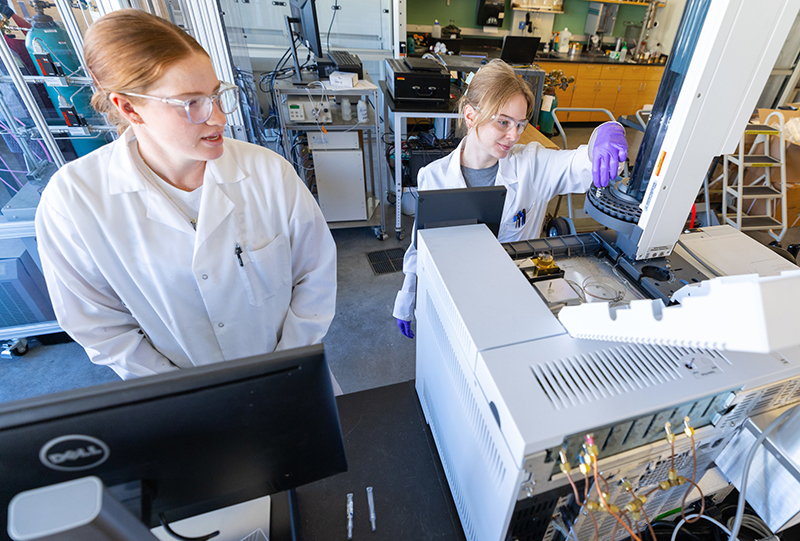
(l-r) Mechanical engineering doctoral students Sarah Tyree and Madeleine McMahon use a new gas chromatography machine in a lab in the Biorenewables Complex. A strategic plan award last year purchased several pieces of equipment that will expand research capabilities at the Bioeconomy Institute. Photo by Christopher Gannon.
It's not easy to find room in a research project budget to pay for pricy lab equipment. But it's not easy to meet project deadlines when lab instruments are breaking down, either.
An influx of strategic plan funding helped the Bioeconomy Institute bridge that gap, upgrading critical analytical instruments to maintain ongoing research and expand the facility's capabilities. The equipment enhancements will make researchers more efficient and provide the tools for exploring innovative solutions in new areas, said Lisa Schulte Moore, the institute's co-director.
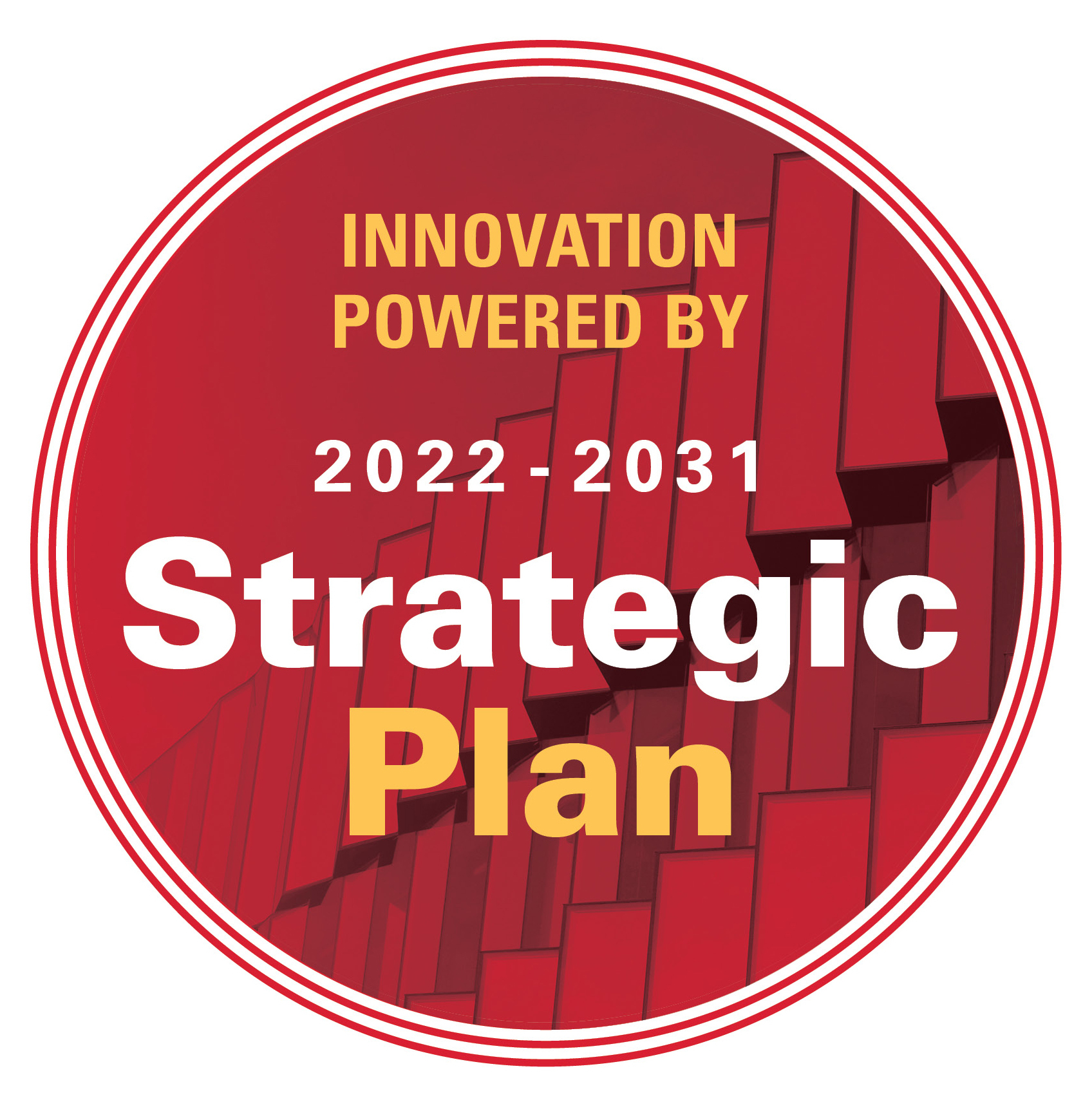
"Our goal at the Bioeconomy Institute is to put Iowa State forward as a leader in the state, nation and world in bioeconomic research. This helps us maintain that capacity and grow it," said Schulte Moore, professor of natural resource ecology and management.
The $300,000 equipment update at the Bioeconomy Institute is one of 19 projects that received nearly $4 million in investments in fiscal year 2024 to support one or more of the 2022-31 strategic plan's five "to be" aspirations. The project aligns with two of them:
- To be the university that creates opportunities and forges new frontiers
- To be the trusted partner for proactive and innovative solutions
Researchers at the Bioeconomy Institute use the equipment to characterize and measure materials, often while converting biomass into fuels, chemicals and other products, said deputy director Ryan Smith.
"You can do a deep dive on the evaluation of inputs and outputs of processes," he said.
Special equipment purchases
The tools are essential for three ongoing projects involving biochar, a carbon-rich form of charcoal that can be used to sequester carbon dioxide in soil while producing bio-based fuels. Those projects include a major carbon removal initiative and studies looking at using willow trees as a feedstock and hog manure as a means to recover nutrients and sequester carbon.
Three of the four instruments purchased with the strategic plan investment replace aging equipment. The fourth item -- an elemental analyzer -- gives researchers a new capacity to conduct low-labor, high-throughput screening of materials throughout the bioproduction process. Smith said that will speed up discovery and possibly lead to new research questions, such as upcycling waste plastic into fuel or other valuable products.
"We can get to answers much more quickly and build different models more efficiently," he said. "It might take two days to test one condition on a larger-scale system, but now we can test dozens of conditions in one day."
The replacement equipment also makes the institute's scientists more efficient, Schulte Moore said. Unreliable older gear brought unexpected delays. And researchers don't have to spend time seeking money to maintain lab infrastructure. The funding agencies that support major research projects often require specific instrumentation, she said.
"We can focus on grants to do the work instead of grants to get the equipment to get the grants to do the work," she said. "I really appreciate Iowa State leadership for recognizing a good investment, both in terms of improving institutional analytical capacity and also for the opportunity to spend more of our time on discovery."
Fountain sculpture to be rededicated on Oct. 4
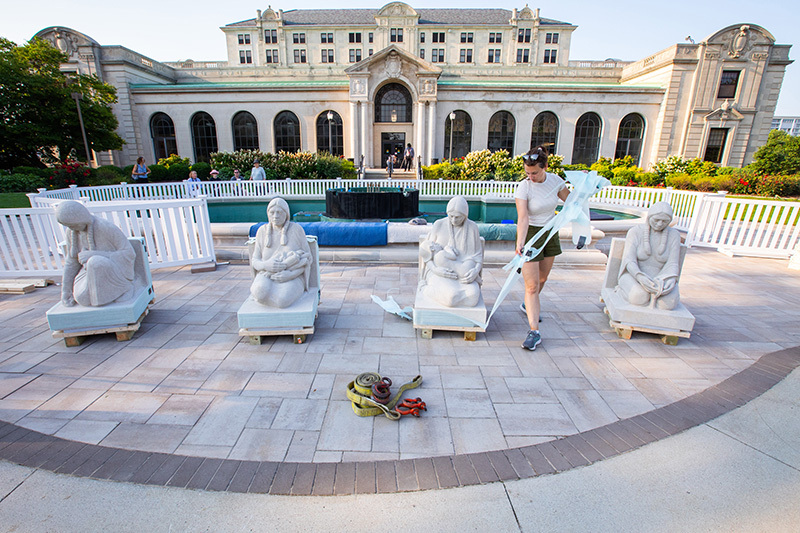
University museums curator Sydney Marshall removes protective wrapping from the replicated maidens before they were lifted into place around the fountain in early August. Photo by Christopher Gannon.
A nearly two-year process to replicate the maidens in Christian Petersen's Fountain of the Four Seasons sculpture will conclude with a rededication ceremony on Friday, Oct. 4 (1:30-2 p.m.). President Wendy Wintersteen and student government president Martin Hursh will speak at the ceremony, near the north entrance of the Memorial Union. All are invited.
Eighty years of rain, ice and wind eroded the limestone surfaces of Petersen's original four maidens and necessitated a solution before all the intricate detail was lost. Replicas of the four maidens were created in the likeness and spirit of Petersen's 1940 originals, which were removed in November 2022. The new maidens were placed in their posts Aug. 5. The concrete fountain pool also was replaced due to deterioration from the elements and the weight of the fountainhead.
"What people will see, probably for the first time in our lifetime, is the full detail of the fountainhead and maidens," said university museums director Lynette Pohlman. "The original maidens will go into our permanent collection storage and will be used in exhibitions in campus museums."
Those in attendance Friday afternoon also will see the fountain turned back on for the first time this semester. Pohlman said one of the original maidens will be displayed during the rededication so people can compare it to the detailed replicas.
"This was done for the students and Iowa State," she said. "It is Iowa State's most iconic public work of art that represents agriculture, the founding of Iowa State and the state of Iowa."
ISU Theatre performances focus on humanity's impact on climate
ISU Theatre's "Fairytales for the Anthropocene" features puppetry, live actors and new short plays with stories at the interplay of survival, extinction, humanity, nature and the imagination. Directed by associate professor of theatre Amanda Petefish-Schrag and led by an 11-member ensemble and talented team of designers, the show opens Friday, Oct. 11 (7:30 p.m., Maintenance Shop, Memorial Union). It brings to the stage for the first time these plays:
- "The Fall," by Petefish-Schrag, associate professor of theatre
- "Portus" by Tiffany Antone, associate teaching professor of theatre
- "The Return of Las Maris" by Diana Burbano
- "Little Blue 52" by Jaisey Bates
- "The Guests" by Darcy Parker Bruce
- "The Ballad of Smokey Quartz" by Ty Defoe
ISU Theatre commissioned playwrights to craft short plays or monologues inspired by the production's title. Each work is an original or reimagined traditional tale with a contemporary twist and contains at least one element of shadow puppetry.
"Fairytales for the Anthropocene" also features music from Iowa State's Cantamus Treble Ensemble, directed by assistant teaching professor of music Jennifer Rodgers and Ames musicians Ben Schrag, Bryon and Rachel Dudley, Aaron Alcott, Greg Bruna and Jordan Mull.
Other showtimes are Oct. 12 at 7:30 p.m. and Oct. 12-13 at 2 p.m. General admission is $20 and can be purchased in advance through the M-Shop or at the door if available as seating is limited. Youth and student tickets are free and available only at the door. This production contains mature content.
The familiarity of fairytales
The collection of plays highlights both familiar and new characters from American folk hero Johnny Appleseed to the classic fairytale heroine Red Riding Hood to a family of quartz rocks.
"So often fairytales and myth deal with the intersection of humanity and the natural world," Petefish-Schrag said. "And they exist across cultures. By reimagining fairytales in the context of the Anthropocene, we can explore our impact on the environment through a familiar, yet powerful, lens."
Earth is officially in the Holocene epoch, which started 11,700 years ago after the last major ice age. In recent years, there has been buzz and debate about whether a new geological epoch should be declared -- one called the Anthropocene -- to acknowledge humanity's impact on a changing planet. Derived from the Greek words for "man" and "new," the name appears frequently in pop culture. It helps frame the shared context for these new plays.
Bringing art and science together
Scout Kuehn is an actor performing in four of the plays. Her roles, among others, include a young rock separated from its sibling by external forces, and "The Wolf," a character representing the dark side of humanity's relationship with the oceans. As a double major in the sciences and arts, Kuehn is thrilled to see her areas of study meld on stage.
"These six playwrights dove into almost every aspect of what I study as an environmental science major," she said. "These authors took their time researching and cultivating these beautiful stories in a 'once-upon-a-time' format about our terrifying realities concerning climate change and many other issues."
Kuehn said that researchers and scientists often face a challenge in communicating their important work to the general public. While scientific facts can be hard to digest -- especially when delivered rapidly via social media feeds and news sites -- theatre can slow the pace in ways that lead to understanding and action, Kuehn said.
Light and shadow
ISU Theatre employs a storytelling technique throughout the show that traces back to ancient times. Five students have designed unique shadow puppetry for the production.
"The interplay of light and shadow adds an ethereal quality, bringing the natural world to life in a way that feels magical but also ominous," Petefish-Schrag said. "There's also something that feels somehow 'timeless' with shadow puppetry, perhaps because the form itself is so ancient, and can be traced back to human beings' very earliest acts of community storytelling."
